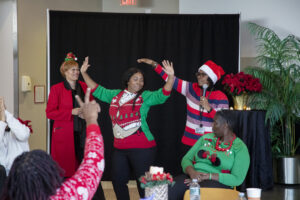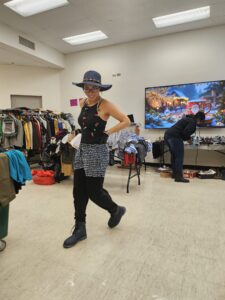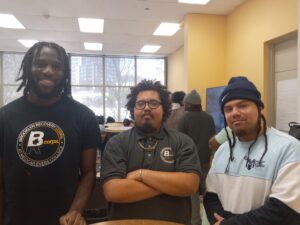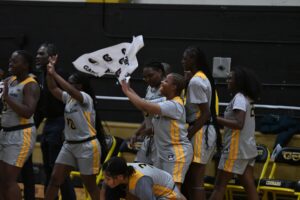December to remember: From joyful holiday parties to helpful markets to incredible athletic achievements

By David Gil de Rubio & Nick Masuda, Office of Communications
Nothing like the end of a semester to sit back and reflect on the amazing three months we’ve had together.
And December was a fantastic way to close out 2024 — and we’ve got some highlights before we collectively ring in 2025.
And off we go . . .
• • •
Ugly Sweater Contest highlights Medgar Evers Holiday Celebration
The college-wide Holiday Celebration was recently held on Friday, December 6, capping off a fall semester of accomplishments. President Patricia Ramsey welcomed the Medgar staff and faculty at the AB-1 Dining Hall by having Mass Communications Lecturer Roman Mitchell serenade the room with ‘The Christmas Song (Merry Christmas to You).”
Following a sumptuous Caribbean cuisine-flavored buffet, the festivities included a raffle of two Michael Kors watches and a pair of JetBlue tickets to wherever the airline flies. The highlight of the event was an Ugly Sweater Contest that started off with seven participants and was eventually whittled down to three finalists.
After a quick dance-off and a crowd-response vote, College Now Associate Director Tracy Noel won first place followed by ASAP Director Lisa LoFaso claiming second place and SEEK Chair/Director Sherrill-Ann Mason taking third place.
Check out more photos from the party:
View this post on Instagram
• • •
The title defense begins for indoor track teams
Squeezing in a pair of meets before finals, both the men’s and women’s indoor track teams traveled the tri-state area and broke multiple school records in the process.
In Staten Island at the Youree Spence Garcia Invitational, the following school records were set: Jaheim Johnson in the 600-meter dash, Aaliyah Bartholomew in the 60-meter hurdles, Nia Butler in the women’s weight throw, while the women’s 4×800-meter relay also set a new school mark.
(Read more here from the Athletics Department’s Stephen Spagnoli, plus a number of weekly conference awards here.)
The following week, at the Art Kaddish Elm City Challenge, hosted by Southern Connecticut State University, the Cougars set another series of school records.
Dontay Washington set a new school record in the heptathlon, while Thenica Thompson, Nana Samake, Shaniya Chung and Kenia Irish-Bramble thrashed the distance medley relay mark. Aaliyah Bartholomew was back at it again, setting the school record in the women’s pentathlon.
This led to a sweep of the CUNYAC weekly awards, which you can read about here.
Fresh off winning conference titles that brought a lot of attention to campus in March and April, both teams have their sights on repeating as CUNYAC champions — and taking their talents to NCAA Regionals and Championships.
They return to action on January 11 back at Southern Connecticut State University for the William Sutherland III Invitational.
Check out this inside look at a road trip with both teams from Jada Clayton, a Brooklyn Recovery Corps intern with the Office of Communications:
View this post on Instagram
• • •
Brooklyn Recovery Corps celebrates fourth year with holiday party
As one of Medgar Evers College’s most successful paid internship programs, the Brooklyn Recovery Corps (BRC) took time out from its goal of providing experiential learning opportunities for its students to host a holiday party on Friday, December 6.
Currently numbering 48 participants, the BRC matches interns with non-profit organizations and small businesses in Central Brooklyn with the goal of providing real world, hands-on learning experiences that also serve to spur economic recovery and growth in Brooklyn.
Among the current local nonprofit partners (defined as organizations with 50 or less employees) participating in the 2024-25 school year are the Greater Harlem Chamber of Commerce, the Brooklyn MBDA Business Center and Representative Yvette D. Clarke’s office.
Three of the program’s current participants are Isaac Akindipe, Xavier Colon and Marc Reyes. Seniors Akindipe and Colon and sophomore Reyes admit to reaping the benefits provided by the BRC approach of creating an environment that encourages autonomy that goes beyond most standard internships.
“I would like to be a teacher, so getting the chance to partner with the Edison Youth Center gives me the opportunity to work with kids,” Akindipe said. “I’ve gotten the experience of how to work with kids, be patient with them and learn their habits while I work with them in an afterschool program at P.S. 244, which is the Richard R. Green school.”
Colon, who interns in the Medgar Evers College Communications Department, is equally effusive about his experience.
“They have me writing stories, supporting other events around campus and working on a couple of proposals,” Colon explained. “My goal is to eventually become an event planner and the great thing is that this experience is helping me re-sharpen my professional skills in the world.”
For Reyes, working in the Medgar Evers College School of Professional and Community Development and applying his skills at the Adult Literacy Center has provided him with a full circle moment. As a public school undergrad back in 2017 and 2018 who had to earn his General Equivalency Diploma, he is in a unique position to offer support to those enrollees currently undergoing what he went through a few short years before.
“I actually help out with these students knowing that a lot of them get nervous about taking the test and I tell them it’s not as bad as what they think based on my own experiences,” Reyes said.
His current stint working at Medgar Evers College also opened Reyes’ eyes to the myriad opportunities afforded to the student body all while learning how to navigate the professional world. It’s knowledge he’s eager to share.
“For me what I’ve gained is more like understanding how the college is and the types of resources it has,” Reyes said. “I like to share those kinds of things with other people who might not be aware of that. BRC also teaches a lot of how to conduct yourself. They’re always reminding you about professionalism and just being very on top of things. When it comes to being late, they don’t play those games—they want you to be on time. They want you to compose emails correctly. It all comes down to teaching you to be on your p’s and q’s.”
It’s certainly a sentiment BRC Lead Peter Holoman subscribes to, particularly when he talks about all the great work he’s seen Medgar Evers College students achieve since the program began.
“Excellence comes when you do the work,” he said. “BRC interns continue to do the work. They’ve been showing up and demonstrating the importance of effective partnerships and collaboration especially with businesses in their communities that mirror their experience.”
If you’d like to apply to be a part of the BRC program, make sure to apply for the Spring semester here. The deadline is January 4, 2025.
• • •
Basketball teams in full swing — and picking up early victories
The men’s hoops team spent this weekend hosting Dr. Carol V. De Costa/Go 4 The Goal Tournament at the Cougar Cave, welcoming The College at Old Westbury, SUNY Polytechnic and Colby Sawyer to town.
Coming into the tournament, Medgar Evers had already matched its win total from last season, beating Pratt Institute (Dec. 2) and Manhattanville University (Dec. 8).
The men’s team will open conference play at Hunter College on Jan. 8 at 7 p.m.
Meanwhile, led by four players in double-figures points — with senior Jennifer Metra leading the way with 21 points and star guard Aaliyah Lyons adding 17 more — the Medgar Evers women’s basketball team opened conference play with an emphatic 75-32 win over CCNY in the Cougar Cave.
After a multi-week break, the women’s team returns to action on Saturday at Manhattanville University, while joining the men at Hunter on Jan. 8 at 5 p.m.
Check out this incredible hype video from Jada Clayton, an intern with the Office of Communications:
View this post on Instagram
• • •

Transition Academy hosts Finders Keepers Market
Between the pressures of the holiday season, the Finders Keepers Market recently hosted by the Medgar Evers College Transition Academy on December 11 couldn’t have come at a better time.
Attendees had a choice of clothing, baby/infant items and home appliances including air fryers, microwaves, coffee makers, George Foreman grills, curling irons, rice cookers, hot plates and toasters all available on a first-come, first-serve basis.
The Medgar Evers College Transition Academy is a support system for students experiencing homelessness, transit and/or food insecurity issues. Among the resources it provides are food vouchers, assistance with SNAP (Supplemental Nutrition Assistance Program) applications, job placement, a food pantry and advocacy and referrals for students dealing with domestic violence.
• • •
SEEK program origins highlighted in Five Demands documentary screening
When the CUNY Rising Alliance, in collaboration with the Professional Staff Congress (PSC), had a recent screening of the documentary The Five Demands attendees received a history lesson about the origins of the SEEK program. Centered at the heart of the film is an activist action fueled by a small group of Black and Puerto Rican students that led to the shutting down of the City College of New York in April 1969. At the time, this iteration of City College had a student body that was 97 percent white in 1967 despite being located in the heart of Harlem.
A crucial driver of this fight against institutional racism that had shut out people of color from this and other public universities was the involvement of SEEK. This program’s students formed the Committee of 10, which led negotiations with the administration, led by then-President Buell G. Gallagher, himself, a pioneer in race relations.
Launched at City College as a pilot program in 1965 with 113 students, SEEK (Search for Education, Elevation and Knowledge) was founded by Dr. Allan Ballard and psychologist Leslie Berger. (Ballard was later appointed to be the first African-American Assistant Dean at City College). SEEK was launched as an affirmative action admissions, teaching and support strategy that gave students the opportunity to go to college who might not have met admissions standards, but showed academic promise and had financial need.
By July 1966, State Assembly members Percy Sutton and Shirley Chisolm secured $1 million in New York State funding to expand across the City University of New York’s four-year colleges. This anti-poverty program quickly ended racial exclusion in CUNY admissions and by fall of 1967, 94 percent of all SEEK students were Black or Puerto Rican and by fall of 1968, SEEK supported more than 1,800 students across CUNY, with an annual budget of $3.5 million.
Five Demands outlines the resistance Black and Puerto Rican pupils met from faculty and many of their fellow students. When the aforementioned Committee of 10 met with Gallagher demanding greater diversity on campus and was met with silence, the decision was made by roughly 100 Black and Puerto Rican students to chain up the iron gates of CCNY’s south campus, effectively locking out the surrounding Harlem community. A sign was also posted outlining the Five Demands:
- A school of Black and Puerto Rican Studies.
- A separate orientation program for Black and Puerto Rican students.
- A voice for students in setting the guidelines and governance of the SEEK program, including the hiring and firing of faculty.
- That is the racial composition of all incoming classes reflecting the Black and Puerto Rican population of all New York City high schools.
- A requirement that all education majors take courses in Spanish language and Black and Puerto Rican history.
The takeover may have only lasted 14 days, but it changed the face of higher education. Juxtaposing archival footage and modern-day interviews, Five Demands blows up commonly held narratives about this open admissions policy that ran from 1970 through 1995. Contrary to popular belief, the administration were the ones to propose and enact open admissions as it was not part of the students’ negotiated demands. And while it may have led to tuition being enacted on what had previously been a free public institution in 1976, much of it was driven by then-Governor Nelson Rockefeller’s already slashing CUNY’s budget just as New York City was entering into a huge fiscal crisis.
The aftermath of these two volatile weeks that changed the face of higher education included the solidification of SEEK at CUNY. Close to 40 percent of the 1965-1967 City College SEEK students graduated by 1972. Through individual and group counseling, comprehensive academic support services and financial aid counseling and support, SEEK continues to help students overcome social, academic and economic barriers to the pursuit of their education. With the recent Supreme Court ruling rejecting affirmative action, the need to be reminded of what went into the struggle for equality and racial justice thanks to programs like SEEK and highlighted by Five Demands has never been more important.


